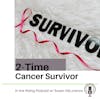Power, Healing, and Self-Compassion: How to forgive yourself!
In the Rising 3 Episode Show Notes
1. Examine what you are holding onto, and whether it is worth it.
2. Realize that your power is in your future, while your lessons are in your past.
3. Identify what about that event is really hurting you. Look inward for answers.
4. Self-compassion is important, and can add more to your life and your future.
Resources:
The article discussed is
Scott R. Ross, Anna C. Kendall, Kasee G. Matters, Mark S. Rye Mark S. Rye & Thomas A. Wrobel (2004) A Personological Examination of Self- and Other-Forgiveness in the Five Factor Model, Journal of Personality Assessment, 82:2, 207-214, DOI: 10.1207/s15327752jpa8202_8
http://www.thelawofattraction.com/forgive-techniques-self-forgiveness
Connect with me!
I invite you to listen to In the Rising Podcast- a show dedicated to helping others create change and a life that they really want.
"Living the life I want" was a phrase that I heard often while working with clients going through cancer, and so I created this podcast. I also saw that there is a gap in knowledge about cancer, lymphedema and how to manage recovery, so I created Fit after Breast Cancer.
Thank you for your time and interest in this podcast! I invite you to leave a heartfelt review on whichever podcast platform you listen to. It does so much to bring exposure to the podcast and helps lift others up!
Connect with me!
Website: In the Rising Podcast Website
Email: Bettina@intherising.com
In the Rising Pinterest:
In the Rising Facebook
Many of my guests have come through Podmatch. If you are interested in joining this, or feel that you have a story should be on a podcast, check this out. * This is an affiliate link *
In Good Health!
Bettina
Hello, welcome again to In The Rising Podcast. I'm your host, Bettina Brown, and this is where I talk to you about living a life without the captivity of guilt and regret so that you can use your self-worth to live an empowered, independent, and free life. And I will start off again by saying I am not a licensed counselor, psychologist, psychiatrist, but I'm a student of life, a healthcare professional who loves to research and loves to talk about anything and everything which involves living our best life, best version of life, best intention of life.
Just best of anything. And so the question of the day today is how to forgive yourself. How do you forgive yourself? Is it easy? Is it hard? Is it because you're your own biggest critic that you find this hard? This is a question I have personally struggled with over and over again from big things to small things.
and the bottom line is I am extremely forgetful and I know this is a weakness of mine and I tend to forget a lot of things my own son will ask me as we're pulling outta the garage. Hey mom, did you remember to check the oven and did you unplug the iron? , and usually I know the answer, but sometimes I will admit it.
I park to recheck because I forget a lot of things. I have yet to forgive my own son. But I have forgotten to pay the water bill and learn the hard way. So, yep, I said it. It's out there. I have done things that are extremely embarrassing, and I had a hard time forgiving myself for that too because, you know, my son lives in this house.
But after the moment of frustration and panic is over, things usually just calm down. But then there are bigger things that can be harder to forgive yourself. and usually, the question of how these actions and decisions have affected my future and affected the lives and the future of those around me, including and particularly my own son.
So just with everything forgiving yourself starts with awareness. At least that's what Ross Kendall matters, mark and Ry. Talk about in their article, which is a personological examination of self and other forgiveness in the five factor model. And the bottom line is that there are five things that we can do to help us forgive ourselves.
And that first one is just realizing that you're a human. And understanding that there are things that you probably haven't forgiven yourself over, and I'm assuming that some of y'all, maybe all of y'all have had some events in your life that you're not exactly proud of. I know for sure that I'm one of them, and there have even been episodes of my life that.
I have pushed so far out of my brain trying to forget them, that I'm shocked when I remember them because I'm so appalled by my own actions. And so then comes the next question, is my own inability to forgive myself and embrace the fact that I'm human and by default, imperfect? Do I just need to extend a little grace to.
The reality is, yes, we do need to extend that grace to ourselves and understand that we are human. It's one thing to just keep doing it and, and not caring. It's another to realize that it was a big deal. And so how does self-forgiveness really happen? And, one of those big steps is being aware you haven't done it.
And is it. Holding onto figuring out, is it really worth holding onto If it happened 10, 20, 30 years ago, the likelihood that the consequences are still in your life is, is is there, it's always gonna be there. But has the lesson been learned from that, either the lesson for you directly or for those around you?
you know, is that space that's holding, in my past, is that past more important to hold in my present or can I be better, a better person, better friend, more present with the situation and the people involved right now and those in my future? It's a huge thing. And so there is, another point number three is that identify what the hurt is to treat.
My example of this is my issue with having gone into some serious debt. I have wanted to live the life of. what the Joneses have. And not even just the Joneses, but the Smiths, the Johnstons, like any more browns. I, I just wanted to live that life and I wanted to have some of those things. And if I wanted them for myself, I got them.
And if those around me that I loved wanted them, I got them also. So I had a capability, but it was a misuse of resources. And so I was embarrassed. I was embarrassed that. I lived a life that I had to work more than one job, more than two jobs, sometimes seven days a week, 14 days in a row, 22 days in a row, because I'm.
At that point where I was living with what I, the poor decisions of my past, but I had to realize that that financial issue had nothing to do with finances. It had a lot to do with people pleasing. It was me being out of my normal element, and so I had to identify below the money to figure out what the problem was.
and extend myself some more, compassion. And so when you do recognize that you need to forgive yourself, this actually leads to less anxiety and less depression. At least that's what Stanford University's scope's newsletter says in their, success in law of attraction site. I guess Stanford has success in law of attraction too, but they talk.
Anxiety and depression being linked to the lack of self-forgiveness. They also talk about, which I thought was very interesting, that some of our very neurotic behavior can be linked to the fact that we haven't forgiven ourselves about things. kind of interesting. And then there's even more research that shows that people who extend themselves, you know, some self-compassion, they're able to achieve more, learn more, and remain inspired and motivated for longer periods of time.
So, it's not about devaluating the situation devaluating, what you did or what someone else did in your circumstance, but just recognizing its place and its stance in your life. And it doesn't need to have a stance and place that is upfront in your face all day, every day. Somehow there's a view that being self-critical leads to, you know, self-improvement, but, Self-evaluation can lead to, so to improvement, but being self-critical is just evaluating yourself.
So, there is so much about how you can forgive yourself. And it's basically starting off with awareness, finding that you haven't forgiven yourself for everything. Recognizing that you're human, giving yourself some, some compassion. Identifying the hurt to treat it and realizing. If you give yourself an opportunity to slow down, acknowledge that X, Y, Z happened and that you may have had to do X, Y, Z in return, that that is also based on your thinking and your mentality and your psychology at that moment.
But now you're different. Hindsight is always very clear, but. Instruction, the lesson that we can learn out of that can do so much more for our future. And in that future, we can do so much more for other people. So self-forgiveness is not just about you, but about enriching the lives of those closest next to you that you want to make a positive impact for.
So, I hope you found this episode valuable, and if you did, like always leave a review and subscribe, I'd appreciate hearing from you. And I'd also appreciate if you, email me Bettina in the rising.com with any other tips, strategies that you've ever used or other ideas that you'd like to learn a little bit more about or have a little more research in front of you.
You guys have a wonderful day.



![Episode image for [ITR Short] Triumphs and Reflections of a Cancer Conqueror Episode image for [ITR Short] Triumphs and Reflections of a Cancer Conqueror](https://images.podpage.com/https%3A%2F%2Fstorage.buzzsprout.com%2Fojfqdzb8zfyjt3ao84o1w4cbto8b%3F.jpg?auto=format%2Ccompress&w=100&s=75ff4af7f7137349cf8af82f22fbc34b)
